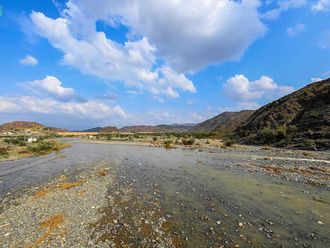Manama: Saudi Arabia has denied reports that a Saudi child was living with his Syrian mother in the Zaatari refugee camp, a sprawling mass of tents in northern Jordan for around 80,000 Syrians who had fled their war-torn country.
Media platforms have reported the presence of the child with his mother in the camp located near the Jordan-Syrian borders.
However, the Saudi embassy in the Jordanian capital Amman said the reports were not true.
“The child and his non-Saudi mother live in Amman, and his father is in regular contacts with the embassy,” the diplomatic mission said in a statement carried by Saudi daily Okaz on Sunday.
“The father married his Syrian wife without obtaining the required permission from the competent Saudi authorities. Under the Saudi system, the son cannot enter Saudi Arabia.”
The embassy added that the possibility for the child’s mother to enter Saudi Arabia was within the prerogatives of the Ministry of Interior.
Saudi Arabia has strict rules about mixed marriages and Saudi nationals need special permissions to take non-Saudi spouses.
In October, a 17-point requirement list was issued to govern the marriages of Saudis with foreigners.
Under the rules, a Saudi man has to be between 40 and 65 years old to be able to marry a non-Saudi woman, and a Saudi woman has to be between 30 and 55 if she wants to take a non-Saudi husband.
A Saudi man has to make at least 3,000 Saudi riyals (Dh2,935) a month and to have an adequate house or apartment to have his mixed marriage approved.
The woman who he wants to marry must be at least 25 years old and the age difference between the two spouses in all cases must not exceed 30 years.
If the male applicant is divorced, at least two years should pass following the separation before he applies to marry a foreigner, and in case he is already married to a Saudi woman and wants a foreigner as a second wife, he must produce a certificate from a public or private hospital stating that his first wife is unable to assume all her marital responsibilities or is infertile.
The certificate must be endorsed by the Ministry of Health.
The applicant must also sign a document stating that the approval of the marriage does not necessarily mean that his foreign wife would be granted the Saudi citizenship.
The rules for Saudi women planning to marry foreigners include a clause that stipulates that the age difference between them must not exceed 10 years.
The condition was set to ensure there is no exploitation of Saudi women.
The only exception for the minimum age for the woman is the existence of a physical handicap or special needs, including being born to unknown parents.
In such cases, the minimum age is lowered from 30 to 27 and should be approved by the social affairs ministry.
A non-Saudi cannot take a Saudi wife if he is already married or if he had married a Saudi woman. He must also present a certificate showing that he has no criminal record in his country of origin and in Saudi Arabia.
He must also present evidence he is not suffering from any infectious or genetic diseases.
He must not have been a member of the military in a foreign country, must not be on the lists of those banned from entering Saudi Arabia, must have a monthly salary of at least 5,000 Saudi Riyals and a valid residence permit and must possess an appropriate family residence.
He must not be stateless and must have a specific nationality that he can prove with a passport from his country that has at least another 12 months of validity. He must also clear all security checks to be carried out by the competent authorities in Saudi Arabia.
The Saudi woman has to sign a statement that her marriage with a foreigner did not necessarily mean he or their children would have the right to be granted the Saudi citizenship.
The regulations call for the establishment of a committee tasked with looking into all applications by Saudis to take foreign spouses.
The members should give their opinion on the request within one month of receiving the application.












